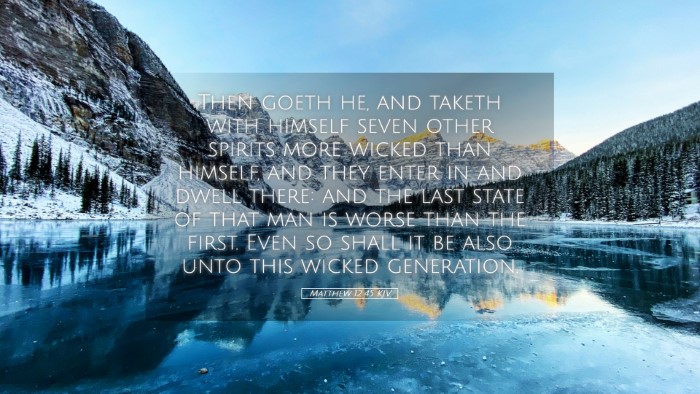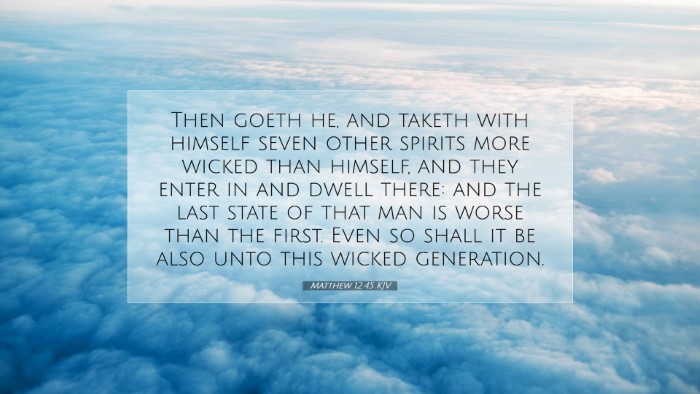Commentary on Matthew 12:45
Verse Context: Matthew 12:45 reads, "Then goeth he, and taketh with himself seven other spirits more wicked than himself, and they enter in and dwell there: and the last state of that man is worse than the first. Even so shall it be also unto this wicked generation." This verse follows Christ’s discussion on the dangers of spiritual emptiness and warns against the perils of falling back into a state worse than the one from which one has been delivered.
Analysis and Insights
This verse serves as a profound warning regarding spiritual reformation and the dangers of returning to a state of sin and wickedness after having experienced some form of redemption or cleansing.
Matthew Henry's Perspective
Matthew Henry emphasizes the notion of spiritual vacuity when an individual is cleansed from unclean spirits but fails to fill their heart and life with righteousness. He notes:
- This passage highlights the transition from a state of possession by evil spirits to a state of emptiness, leaving one susceptible to greater evil.
- Henry considers the return of the unclean spirit as a representation of a heart that is not rooted in the faith of Christ, thereby inviting further spiritual decline.
He articulates that the man's end is worse than his beginning, underscoring the importance of spiritual vigilance and the necessity of filling one’s heart with righteousness to prevent a worse condition.
Albert Barnes' Commentary
Albert Barnes elaborates on the dangers of indifference and the peril of not cultivating a relationship with Christ. He notes the following points:
- The unclean spirit's return signifies the idea that, after being cleansed, if one does not fill that void with faith and good works, they are left open to greater evils.
- Barnes asserts this return is emblematic of a state of moral decay, indicating that being merely ‘clean’ is not sufficient; one must actively pursue a godly life.
He also emphasizes that the wickedness in the heart is amplified if God’s grace is rejected, hence the significance of a committed and ongoing relationship with God.
Adam Clarke's Interpretation
Adam Clarke provides a thorough interpretive framework highlighting the conditionality of grace and the human response to divine intervention:
- Clarke interprets the 'seven other spirits' as an amplification of the initial evil condition, suggesting that the consequences of falling back into sin can be exponentially worse.
- He refers to the verse as indicative of the "moral law," delineating the requirements of maintaining one's spiritual rigor and responsibility to God.
According to Clarke, should one allow their spiritual life to lapse without filling it with good, it becomes an inviting ground for greater levels of sin.
Theological Implications
Theologically, this passage speaks volumes regarding the Christian journey. It emphasizes several crucial themes:
- Necessity of Filling the Heart: The necessity of being filled with the Holy Spirit lest one become vulnerable to greater spiritual attack.
- Ongoing Vigilance: An ongoing alertness to one’s spiritual condition to prevent backsliding and the dangers that come with it.
- Community Responsibility: The verse serves as a communal admonition to support one another in faith, recognizing the potential for moral decline.
Practical Applications
For pastors, students, and theologians, this verse offers several practical applications:
- Encouragement to Disciple: There is a profound call for the church to engage in discipleship, helping believers to develop a robust relationship with Christ.
- Call for Personal Reflection: Individuals are encouraged to reflect on their spiritual state, examining the areas where they may be vulnerable to spiritual attack.
- Community Accountability: Engage in practices that promote accountability among believers to safeguard against the spontaneity of falling back into destructive habits.
Conclusion
In conclusion, Matthew 12:45 serves as a potent reminder of the significance of not only being delivered from spiritual bondage but the necessity of actively pursuing a relationship with God and living a life filled with the Holy Spirit’s guidance. The insights provided by Matthew Henry, Albert Barnes, and Adam Clarke collectively enrich the understanding of this passage, urging believers to recognize the grave dangers of apathy and the imperative of a committed and proactive faith journey.


